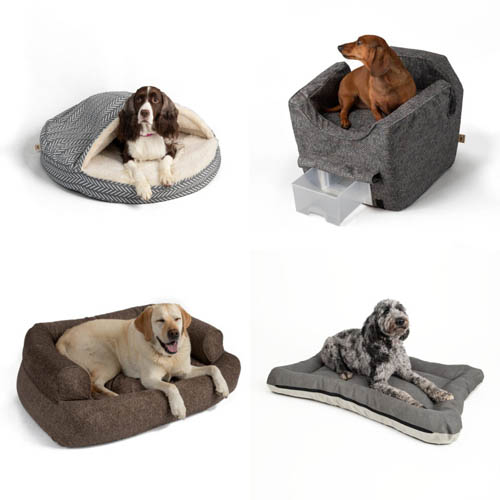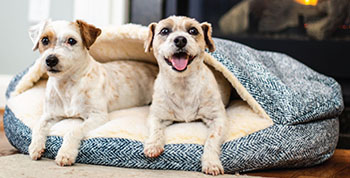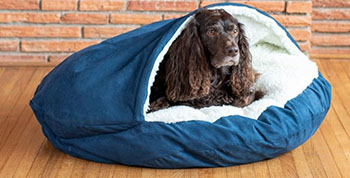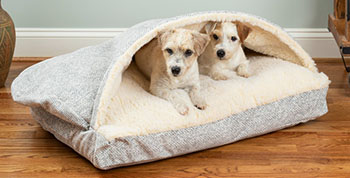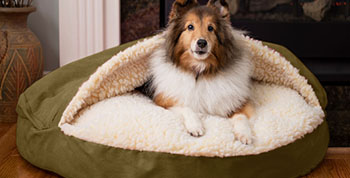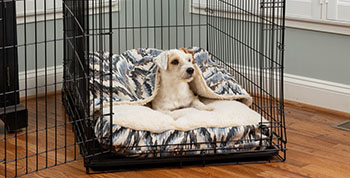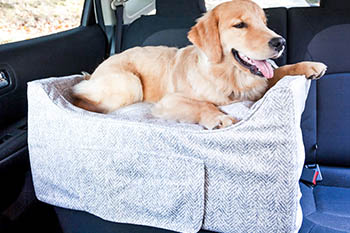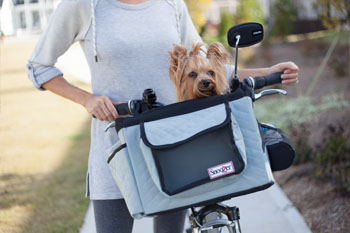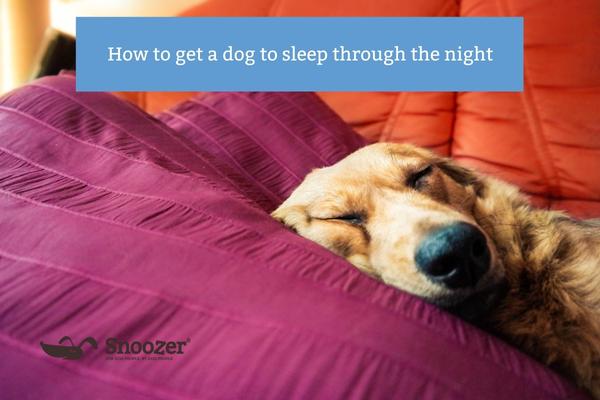How to Get Your Dog to Sleep Through the Night?
A dog that doesn’t sleep through the night can disrupt the whole household. Luckily, if your dog has trouble falling or staying asleep, you can do something about it. Here are several things to try to address your dog’s insomnia.
Have the Right Expectations
First, it’s important to understand canine sleep so you have the right expectations.
Even though dogs sleep a lot – about 12-14 hours a day, depending on age, breed, and health – this sleep occurs in short sleep cycles of approximately 20 minutes each. Dogs can go through 20 or more of these sleep cycles back-to-back overnight, with brief periods of waking in between. It’s common for dogs to get up and change position during some of these brief wake ups. Some might even groom themselves for a few minutes or go get a drink of water but then go right back to sleep.
If your dog does these things, just know that it’s normal, and it’s not a problem that needs to be fixed. However, if your dog is awake for extended periods of time during the night and has trouble getting back to sleep, then you should take steps to help them sleep better.
End Nighttime Potty Breaks
Is your dog waking in the middle of the night to go potty? Try these steps to nix this disruptive habit:
– Potty train your puppy or reinforce housetraining skills you’ve already worked on
– Go out for one last potty break right before bedtime
– Avoid giving water for 2 to 3 hours before bedtime
– Address underlying medical conditions that can wake dogs at night to go potty, such as diabetes, kidney disease, UTIs, GI troubles, and more – talk to your vet
Note that puppies under 5 months of age shouldn’t be expected to make it through the night without waking to go potty.
Wear Your Dog Out with Exercise
Dogs that don’t get enough exercise during the day may find it hard to fall asleep at night. Make sure your dog is getting the right amount of physical activity for their age, breed, and health. Add in an extra long walk or a play session at the dog park during the day to see if it helps.
Give Your Dog a Comfortable Dog Bed
Does your dog seem to get up and change position a lot – more than once or twice – during the night? That could be a sign that it’s time for a dog bed upgrade. Check out a large range of high-quality, comfortable dog beds and crate pads from Snoozer. A comfortable and supportive place to sleep is important for quality sleep, especially if your dog has a medical condition like arthritis and could benefit from an orthopedic dog bed.
From cozy hooded dog beds to large dog beds for sprawling to plush dog sofas, Snoozer has dog beds to suit every kind of canine sleeper!
Address Underlying Medical Issues
Your dog’s insomnia may be due to an untreated medical condition. Some lead to nighttime waking to pee, like UTIs or diabetes, as mentioned above.
Pain is also a reason your dog may wake during the night or have trouble falling asleep. If your dog has arthritis, cancer, or another chronic condition, talk to your vet to make sure they have the right pain medication they need and that the dose is strong enough to allow them to sleep.
Itchy skin from food allergies, environmental allergies, hot spots, fleas, bug bites, and more can also keep your dog up at night. If you notice your dog scratching or biting at their skin, this is most likely the problem.
Canine cognitive dysfunction, known by some owners as doggy dementia, is a common cause of sleep disruptions in older dogs. While this can’t be cured, it can be treated to help alleviate some symptoms.
These are just a few of the most common medical reasons for canine insomnia. Talk to your vet about your dog’s health to pinpoint what’s wrong and make a plan to address it.
Address Underlying Emotional Issues
Just as humans may lay awake at night due to anxiety, dogs can experience stress-induced insomnia, too. Anxiety may spring from a recent life change such as moving house, adding or losing a family member, or a new daytime routine. Or it could be chronic.
If you suspect stress or anxiety as the underlying cause of your dog’s waking up at night, talk to your vet about what to do. There are a variety of natural treatments to try as well as some prescription medications that can help.
Create a Bedtime Routine
Bedtime routines cue the brain that it’s time for sleep. Implement a simple routine, for example, a last trip outside to pee, then a nice belly scratch or back rub once your dog has settled on their dog bed, then lights out. Your dog may enjoy listening to some quiet music or cuddling with a special toy, so you can make those part of your routine, too. Follow the same steps every night so your dog knows what’s coming next, and over time even a simple routine can prime a dog for sleep.
Consider Crate Training
Even if your dog doesn’t use a crate during the day, consider using one at night for sleep. Going into the create at the end of the day can be a strong cue that it’s time to sleep. You can make the crate more cozy and comfortable with dog crate pads and covers.
Try Some Dog-Friendly Medication
If you’ve tried other steps and they haven’t worked, then medication is an option, ranging from all natural to prescription drugs.
Over-the-counter calming chews, treats, and drops formulated for dogs to help them sleep made with natural ingredients such as melatonin, CBD oil, chamomile, B vitamins, and tryptophan are popular and easy to find.
Benadryl is another OTC medication that some dog owners swear by. The active ingredient, diphenhydramine, induces sleepiness in dogs (and humans, too). But regular use of Benadryl can have negative short-term and long-term side effects, so it’s best to talk to your vet about it first.
Prescription sedatives, anti-depressants, anti-anxiety pills, and other kinds of medications are also an option for dogs with severe insomnia; talk to your vet.
A Good Night’s Sleep
While brief wake-ups during the night to change position are normal, difficulty falling asleep and protracted periods of being awake in the middle of the night are not. Now you know how to address your dog’s insomnia so they can get the healthful, restorative sleep they need, and that you need, too!

